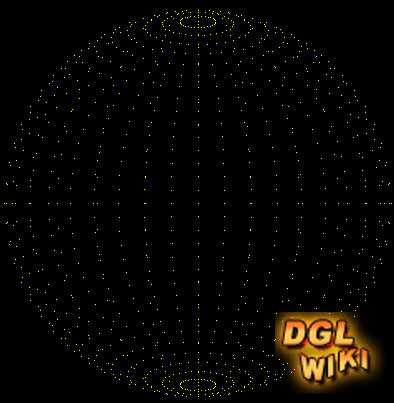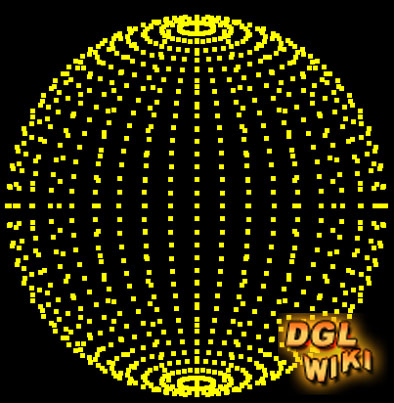glPointSize: Unterschied zwischen den Versionen
Shadow (Diskussion | Beiträge) |
|||
| Zeile 1: | Zeile 1: | ||
| − | + | {{Unvollständig}} | |
| + | = glPointSize = | ||
| + | |||
<br> | <br> | ||
| − | + | == Name == | |
| − | + | '''glPointSize''' - legt den Durchmesser von Punkten fest. | |
| + | |||
<br> | <br> | ||
| + | == Delphi-Spezifikation == | ||
| + | Syntax der Funktion (bitte an die dglOpenGL.pas halten), vorerst auch '''nur''' Delphi-Syntax. Bitte haltet euch dabei an folgende Vorgabe, die der Formatierung der glMan-Pages entspricht, und die für das Wiki wichtigen Teile der Syntax hervorhebt : | ||
| + | |||
| + | procedure '''glPointSize'''(''size'' : GLfloat); | ||
| + | |||
| + | |||
<br> | <br> | ||
| − | + | ||
| + | == Parameter == | ||
| + | |||
| + | {| border="1" rules="all" | ||
| + | ! ''size'' | ||
| + | | Bestimmt die Größe der gerasterten Punkte. Der '''Vorgabewert ist 1.0'''. | ||
| + | |} | ||
| + | |||
<br> | <br> | ||
| − | [[Bild:Glpointsize1.jpg]] | + | |
| + | == Beschreibung == | ||
| + | <b><i>The glPointSize function specifies the rasterized diameter of both aliased and antialiased points. Using a point size other than 1.0 has different effects, depending on whether point antialiasing is enabled. Point antialiasing is controlled by calling glEnable and glDisable with argument GL_POINT_SMOOTH. | ||
| + | If point antialiasing is disabled, the actual size is determined by rounding the supplied size to the nearest integer. (If the rounding results in the value 0, it is as if the point size were 1.) If the rounded size is odd, then the center point (x, y) of the pixel fragment that represents the point is computed as | ||
| + | |||
| + | ( ëx (w) û + .5 , ëy (w) û + .5) (Für korrekte Formel bitte die org. Spez. einsehen) | ||
| + | |||
| + | where w subscripts indicate window coordinates. All pixels that lie within the square grid of the rounded size centered at (x , y) make up the fragment. If the size is even, the center point is | ||
| + | |||
| + | ( ëx (w) + .5û, ëy (w) + .5û ) (Für korrekte Formel bitte die org. Spez. einsehen) | ||
| + | |||
| + | and the rasterized fragments centers are the half-integer window coordinates within the square of the rounded size centered at (x, y). All pixel fragments produced in rasterizing a nonantialiased point are assigned the same associated data; that of the vertex corresponding to the point. | ||
| + | If antialiasing is enabled, then point rasterization produces a fragment for each pixel square that intersects the region lying within the circle having diameter equal to the current point size and centered at the points (x (w) , y (w) ). The coverage value for each fragment is the window coordinate area of the intersection of the circular region with the corresponding pixel square. This value is saved and used in the final rasterization step. The data associated with each fragment is the data associated with the point being rasterized. | ||
| + | |||
| + | Not all sizes are supported when point antialiasing is enabled. If an unsupported size is requested, the nearest supported size is used. Only size 1.0 is guaranteed to be supported; others depend on the implementation. The range of supported sizes and the size difference between supported sizes within the range can be queried by calling glGet with arguments GL_POINT_SIZE_RANGE and GL_POINT_SIZE_GRANULARITY. | ||
| + | The point size specified by glPointSize is always returned when GL_POINT_SIZE is queried. Clamping and rounding for aliased and antialiased points have no effect on the specified value. | ||
| + | |||
| + | Non-antialiased point size may be clamped to an implementation-dependent maximum. Although this maximum cannot be queried, it must be no less than the maximum value for antialiased points, rounded to the nearest integer value. | ||
| + | </i></b> | ||
| + | |||
| + | == Beispiel == | ||
| + | |||
| + | Eine Kugel im Polygon Modus '''GL_POINTS''' mit | ||
| + | |||
| + | {| border="1" rules="all" | ||
| + | ! glPointSize(1) | ||
| + | ! glPointSize(5) | ||
| + | |- | ||
| + | | [[Bild:Glpointsize1.jpg]] | ||
| + | | [[Bild:Glpointsize5.jpg]] | ||
| + | |} | ||
| + | |||
<br> | <br> | ||
| + | == Fehlermeldungen == | ||
| + | '''GL_INVALID_VALUE''' wird generiert wenn ''size'' kleiner oder gleich 0 ist.<br> | ||
| + | '''GL_INVALID_OPERATION''' wird generiert wenn '''glPointSize''' innerhalb eines [[glBegin]]-[[glEnd]] Blocks aufgerufen wird. | ||
| + | |||
<br> | <br> | ||
| − | + | ||
| + | == Zugehörige Wertrückgaben == | ||
| + | [[glGet]] mit Token [[glGet#GL_POINT_SIZE|GL_POINT_SIZE]]<br> | ||
| + | [[glGet]] mit Token [[glGet#GL_POINT_SIZE_RANGE|GL_POINT_SIZE_RANGE]]<br> | ||
| + | [[glGet]] mit Token [[glGet#GL_POINT_SIZE_GRANULARITY|GL_POINT_SIZE_GRANULARITY]]<br> | ||
| + | [[glIsEnabled]] mit Token '''GL_POINT_SMOOTH''' | ||
| + | |||
| + | |||
<br> | <br> | ||
| − | |||
| + | == Siehe auch == | ||
| + | [[glEnable]] , [[glLineWidth]] | ||
| − | |||
| − | + | [[Kategorie:GL|PointSize]] | |
| − | |||
| − | |||
Version vom 14. März 2005, 02:09 Uhr
(Mehr Informationen/weitere Artikel) {{{1}}} |
Inhaltsverzeichnis
glPointSize
Name
glPointSize - legt den Durchmesser von Punkten fest.
Delphi-Spezifikation
Syntax der Funktion (bitte an die dglOpenGL.pas halten), vorerst auch nur Delphi-Syntax. Bitte haltet euch dabei an folgende Vorgabe, die der Formatierung der glMan-Pages entspricht, und die für das Wiki wichtigen Teile der Syntax hervorhebt :
procedure glPointSize(size : GLfloat);
Parameter
| size | Bestimmt die Größe der gerasterten Punkte. Der Vorgabewert ist 1.0. |
|---|
Beschreibung
The glPointSize function specifies the rasterized diameter of both aliased and antialiased points. Using a point size other than 1.0 has different effects, depending on whether point antialiasing is enabled. Point antialiasing is controlled by calling glEnable and glDisable with argument GL_POINT_SMOOTH. If point antialiasing is disabled, the actual size is determined by rounding the supplied size to the nearest integer. (If the rounding results in the value 0, it is as if the point size were 1.) If the rounded size is odd, then the center point (x, y) of the pixel fragment that represents the point is computed as
( ëx (w) û + .5 , ëy (w) û + .5) (Für korrekte Formel bitte die org. Spez. einsehen)
where w subscripts indicate window coordinates. All pixels that lie within the square grid of the rounded size centered at (x , y) make up the fragment. If the size is even, the center point is
( ëx (w) + .5û, ëy (w) + .5û ) (Für korrekte Formel bitte die org. Spez. einsehen)
and the rasterized fragments centers are the half-integer window coordinates within the square of the rounded size centered at (x, y). All pixel fragments produced in rasterizing a nonantialiased point are assigned the same associated data; that of the vertex corresponding to the point. If antialiasing is enabled, then point rasterization produces a fragment for each pixel square that intersects the region lying within the circle having diameter equal to the current point size and centered at the points (x (w) , y (w) ). The coverage value for each fragment is the window coordinate area of the intersection of the circular region with the corresponding pixel square. This value is saved and used in the final rasterization step. The data associated with each fragment is the data associated with the point being rasterized.
Not all sizes are supported when point antialiasing is enabled. If an unsupported size is requested, the nearest supported size is used. Only size 1.0 is guaranteed to be supported; others depend on the implementation. The range of supported sizes and the size difference between supported sizes within the range can be queried by calling glGet with arguments GL_POINT_SIZE_RANGE and GL_POINT_SIZE_GRANULARITY. The point size specified by glPointSize is always returned when GL_POINT_SIZE is queried. Clamping and rounding for aliased and antialiased points have no effect on the specified value.
Non-antialiased point size may be clamped to an implementation-dependent maximum. Although this maximum cannot be queried, it must be no less than the maximum value for antialiased points, rounded to the nearest integer value.
Beispiel
Eine Kugel im Polygon Modus GL_POINTS mit
| glPointSize(1) | glPointSize(5) |
|---|---|

|

|
Fehlermeldungen
GL_INVALID_VALUE wird generiert wenn size kleiner oder gleich 0 ist.
GL_INVALID_OPERATION wird generiert wenn glPointSize innerhalb eines glBegin-glEnd Blocks aufgerufen wird.
Zugehörige Wertrückgaben
glGet mit Token GL_POINT_SIZE
glGet mit Token GL_POINT_SIZE_RANGE
glGet mit Token GL_POINT_SIZE_GRANULARITY
glIsEnabled mit Token GL_POINT_SMOOTH
